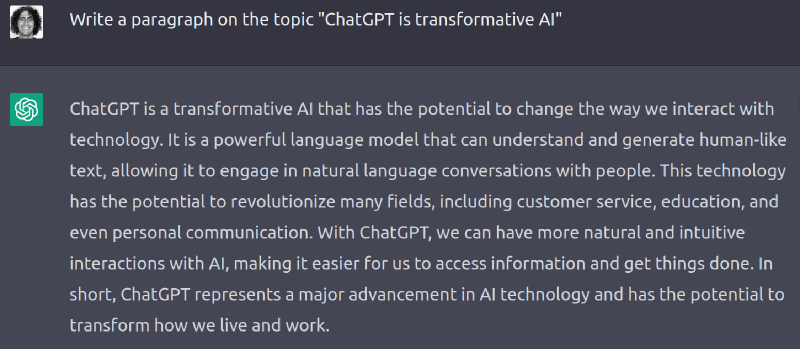I remember the days before Google: Finding answers on the internet was tedious and clunky, I had to switch between search engines or run meta-searches to get workable results, and it still felt like I wasn’t finding all the information that was out there. Then Google came along and everything changed – I felt like I had gained new super-powers.
Using ChatGPT feels at least as transformative as switching from AltaVista to Google. After only a few days of working with ChatGPT, I feel like it has made me much more effective. It’d be hard to go back to pre-ChatGPT life.
It’s worth noting that I tend to be a mid-to-late adopter of shiny new consumer tech. I’m also a bit of an AI hype skeptic. Twitter? Seemed like a useless tool back in the day, and a mostly harmful one these days. Facebook? I resisted for a few years, and reluctantly ended up joining to avoid missing out on real-life social activity. Smartphones? Very useful, but also very distracting – I often have mine on airplane mode to avoid getting sucked in. Crypto? Still too volatile and speculative for me. Dall-E and Stable Diffusion? Fun toys, but not too useful in my everyday life.
ChatGPT is different because it distills information that is out there and makes it relevant to me. I feel like I’m still retaining agency, unlike with social media and other tools that are designed to suck me in. ChatGPT is more like a classic search engine that’s there to help when needed. I’m hooked, but not addicted.
In the past week, my work-related ChatGPT usage included questions about Nginx, Prefect, Python, AWS, React, MySQL, Google Sheets, and probably a few other tools. This makes it vastly more useful than GitHub Copilot, which I stopped using when it became paid. The problem with GitHub Copilot isn’t that it doesn’t provide useful output – some of its code completions feel like pure magic. The issue is more with the interface – it often distracts me from what I’m trying to do. In that sense, it’s less like a copilot and more like a backseat driver.
ChatGPT feels like a helpful copilot, personal assistant, coach, and much more – definitely worth paying for. In addition to technical advice, I asked it questions about the meaning of time, the Joel test for learning designers, rephrasing text, investment, and career-related issues. It wasn’t always correct, but it was often informative and thought-provoking. This is more than can be said for interactions with some humans.
The OpenAI team pretty much nailed the user experience and interface. With an ongoing chat, I can get more useful results by refining my queries. Unlike with a search engine, I don’t need to wade through sometimes-dodgy websites and discrepant interfaces to get what I’m looking for. ChatGPT makes information accessible and useful – like Google’s mission, but often better than Google (though it may catch up).
The exciting and terrifying thing is that the tech is still in its infancy. It’s going to get radically better and different, and disrupt many industries and people. The rise of machine intelligence continues – ChatGPT is a significant transformative AI step.

ChatGPT in its own words
's interpretation of _human brain expanding_](https://yanirseroussi.com/2022/12/11/chatgpt-is-transformative-ai/mage-space-prompt-human-brain-expanding.webp)
Public comments are closed, but I love hearing from readers. Feel free to contact me with your thoughts.
Ralph Haygood
2022-12-12 23:32:24
I’m amused that the first sample on the home page features the user asking, “this code is not working like i expect - how do i fix it?” In my mind, I hear the voice of HAL (Douglas Rain) answer, “This sort of thing has cropped up before, and it has always been due to human error.”
I’ve been assuming ChatGPT is just the latest specimen of what typically passes for AI these days, a system with an elaborate model of utterances disconnected from any deeper and richer model of the world to which utterances refer, hence brittle and shallow. (Such systems more or less realize John Searle’s “Chinese room” scenario, although unlike Searle, I don’t think they represent any fundamental limit on AI, merely the current, crude state of the art.) However, you’ve convinced me to try it out.
Yanir Seroussi
2022-12-14 19:58:34